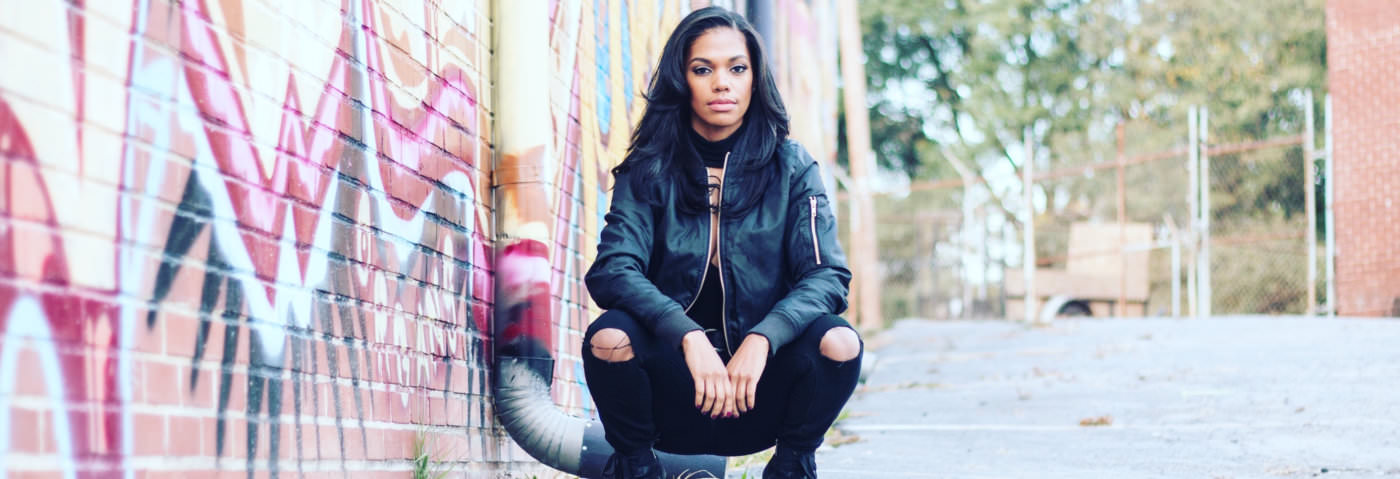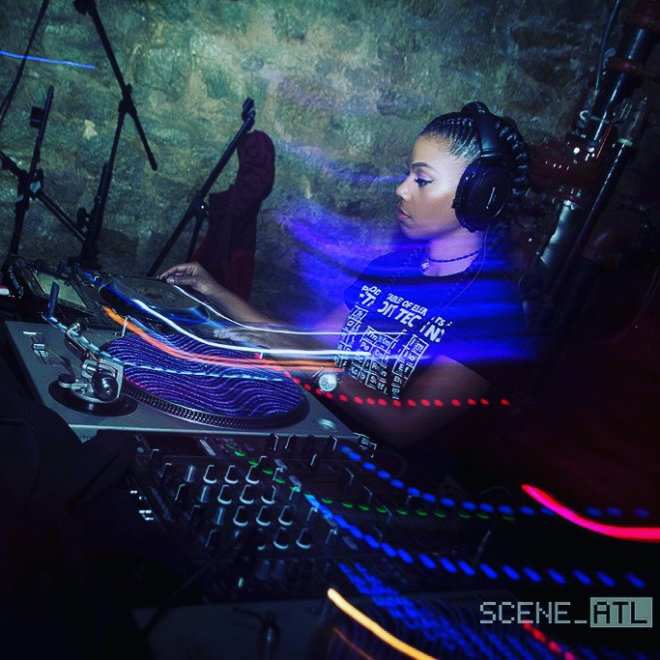Ash Lauryn is concerned that the younger generation are unaware of dance music’s heritage. Kristan Caryl finds out more about her work in helping preserve the culture and the importance of black representation in house and techno.
“What, techno started in Detroit?”
The now Atlanta-based Ash Lauryn 33 year old is recounting a recent trip home to Movement festival. During one afternoon, she was hanging out on the famous riverfront with the Motor City’s shiny, high-rise metropolis in the background. She made small talk with two gentlemen who, it turned out, had no idea the festival even existed.
“Not everyone is so underground, especially the younger people,” she muses. “And sometimes it frightens me a little bit. It makes me wonder if some of these older cats we look up to care – or think about – the preservation and next steps we’re taking in this culture.”
Until she was 21, Lauryn lived with her parents in Rochester Hills, one of Michigan’s wealthiest suburbs and once home to a young Madonna. Her older family members came up listening to The Wizard on WJLB – and her older sister was a raver on the scene – but they didn’t know the wider spectrum of the music. “They didn’t know it was a worldwide culture, they [thought techno] was just our local weekend tracks that DJs played.”
This local under-exposure and unwitting ignorance are in part what motivated Ash to start her blog, Underground and Black. It’s about celebrating black music culture and providing a place for the younger generation to learn about the roots of house and techno. She had already written for the school newspaper, and even in the Michigan Chronicle, a black-owned and operated newspaper in Detroit where her grandmother, Marie Teasley, worked as the woman’s editor for many years.
It’s no surprise, then, that Ash is hugely interested in the intersectionality of being black, and a woman, in the music industry. “Representation is really important,” she says. “The gay community and women are getting huge representation right now, but my passion is black people getting representation. I’m not saying they have been ignored in the past – of course, everyone’s heroes are the black guys from Chicago and Detroit, that’s who everybody looks up to – but like I said before, who is the next future KDJ? Who is gunna be the K-Hand of this?”
The gay community and women are getting huge representation right now, but my passion is black people getting representation.
Almost immediately after we start talking, Ash – who is candid, confident and engaging at all times, pausing only to apologise for the odd unintentional swear word – says she started DJing because she felt she “had to.” She felt there was a need for more women in the scene and especially more black women.
“I felt like it was time to step up to the plate,” she remembers. “I had been growing a stronger and stronger interest in DJing as I spent more time on the dance floor watching and observing some of my favourite DJ’s,” she says, before mentioning Atlanta scene stalwart Kai Alce. She also cites inspiring women like K-Hand, DJ Minx and DJ Holographic, who are friends all representing Detroit on the wider stage, but also a white friend in New York who feels she is struggling to be taken seriously. “Overall, most people have embraced me,” says Ash of her experience.
In less than two years, she has gone from trying her first mix to playing in London, Berlin and the Netherlands, as well as at Dimensions Festival. “I’m grateful to be coming up in this era, when women are more involved and we’re getting opportunities not previously available to us.”
She was actually a latecomer to the scene and was a dancer long before she was a DJ. Her first taste of dance music was tagging along with her older sister to various raves. “Mum thought I was staying with my sister in her college dorm. If she knew what we were doing!”
She loved house music but didn’t have interest in buying records and never researched it further (back then she didn’t even know of Juan Atkins but says the internet and YouTube eventually changed all that). At the time of her teenage years, Detroit was still struggling. She says you never saw a white person, and her mother tells her of a time when white pupils from the school at which she taught weren’t allowed to go on a field trip to the Motown museum downtown because their parents were worried of the dangers. “It wasn’t that bad,” Ash laughs.
Nowadays, along with investment from multi-billionaire Dan Gilbert, white people are pouring back into the increasingly gentrified city. Black people are being marginalised. As such, as soon as she was old enough—aged 21—Ash wanted to get out of “boring Detroit,” so moved to Atlanta, and in with a cousin.
“Atlanta is the black Mecca of America,” she states proudly. It’s a hugely progressive city that is split evenly between black and white people, and despite being in the South, and Republican, is a place black people and black culture prosper, and they have for many generations: not only has the city just elected its first black and female Mayor, but it was also a major organising centre of the civil rights movement, with Martin Luther King and Ralph David Abernathy working closely with students from the city’s gathering of historically black colleges, the largest such consortium in the country.
She moved to the city roughly ten years ago. At first she hung out in places like Velvet Room and Club 112, and was only half interested in the hip-hop, rap and trap scene made famous by Donald Glover’s critically acclaimed comedy-drama, Atlanta (which, says Ash, “did feel like Atlanta,” rather than a glossy version of it). When her friends come to visit her, they’re surprised by the prominence of black people.
“They’re like, ‘wow, you go to these nice establishments and black people own them.” For a while, Ash worked at the upmarket W hotel and enjoyed the fact she was respected there rather than being “in the back of house positions” where black people have traditionally been placed. “I like being in a city that is the pinnacle of black culture right now.”
wow, you go to these nice establishments and black people own them.
She does note, however, that the first thing new people ask when they meet is, ‘where are you from?’ because of the high number of transplants from other cities. “At least 30% of people are from somewhere else, so it’s a melting pot, and right now we’re regrouping and trying to figure out who we are.”
You could say the same of Ash herself. She admits that despite how it might look on social media—the tours, the NTS show, the parties back home—she isn’t yet capable of living full time off DJing. She works part time for Uber, and will probably get another job once she’s back from Dimensions Festival. But she also has aspirations of expanding the blog, selling Underground and Black merchandise—“slipmats, t-shirts, blue jean vest, bumper stickers, maybe even turning it into an agency”—though only on her own terms and says she “is in this for the long game.” She hopes to speak at forums, be a representation for black people, for women, for people who are up and coming. ”I’m trying to find ways to relate and enhance the community as a whole.”
That said, she’s wary of being co-opted by big global brands. “I’m underground and black and I’m true to this shit,” she smiles. “It’s up to you, but you need to make calculated decisions as they can—maybe not ruin you—but take away from who you are and kill the momentum.”
Few people, especially those just starting out, dare speak as openly and honestly. But it’s something we revere the likes of Theo Parrish for and is something of which Ash—always polite, but firm in her views— is proud and unapologetic. She says people ask her if she is “afraid to talk about blackness so much and promote black people so much,” and is mindful that some tragic white people might take offence and cry, ‘oh the music is for everybody.’ “For me, I would compare that argument to the Black Lives Matter vs All Lives Matter movement: just because I’m promoting and want to preserve blackness in dance music doesn’t mean that everybody else doesn’t matter. Being pro something doesn’t mean you’re anti-the other.”
Her message rolls over into the DJ booth, where she admits to not being a crazy deep digger, but instead plays emotive, meaningful American house and techno. “My goal is just to start an experience. I want people to think, ‘oh, Ash Lauryn is playing, let’s go see what she is feeling right now, her trials and tribulations. Simply by me playing underground and black music, and through the visibility of me being up there, I am spreading my message. For me it’s positive reinforcement and reassurance.”
With Ash on the case, you sense the next generation is in safe hands.

